Many athletes are accustomed to preparing for a morning race, but there’s surprisingly little guidance on what athletes should eat and drink before events that start later in the day.
The American College of Sports Medicine (ACSM) have shared guidelines for how to fuel in the build-up, but how should you apply these recommendations when your event starts in the afternoon or evening?
How to fuel before a late race start
Nearly 1 in 10 races in our Athlete Case Study Database start later in the day (from 2pm to the very early hours of the morning). So, if you’re gearing up for a late race start, should your pre-race fueling and hydration be different from ‘normal’? And what else do you need to consider to perform at your best?
We crewed ultrarunners at Madeira Island Ultra Trail (MUIT), where athletes were preparing for a midnight race start. They were inevitably wondering how best to fuel and hydrate throughout the whole day to ensure optimal energy levels when they eventually got to the start line.
When I’m working with an athlete, the first step in planning and optimising their pre-race fuel and hydration is to work backwards from your race start time. The approach will then depend on:
- How much time you have from waking up until the gun goes off
- Race day logistics (travel, registration time, warm-up)
- The demands of the event (distance, intensity and conditions)
Think of it like setting your morning alarm; first you decide what time you need to be somewhere, then how long it takes you to get ready and travel there, and finally factor in how many times you’ll want to hit snooze.
The key to nailing your pre-race fueling is timing and dosing your intake so that you start with maximal liver and muscle glycogen stores (the body’s stored form of carbohydrate, which is the main energy source used during endurance exercise). This is why your pre-race meals and snacks should be carb-rich, with moderate protein and very low amounts of fats and fibre.
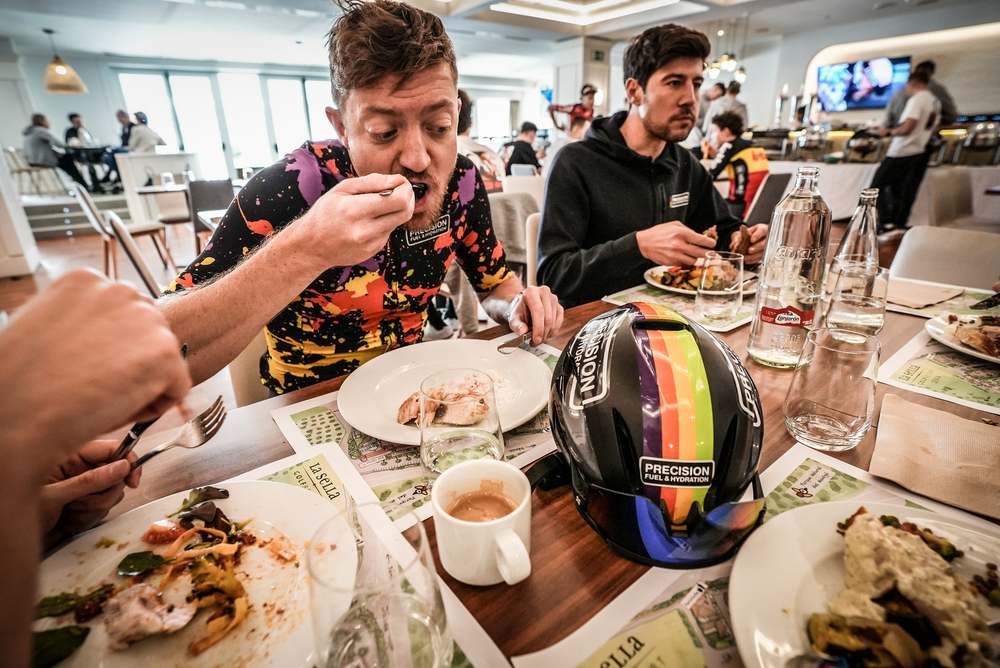
30 minutes before
Taking a small dose (~30g) of easily digestible carbohydrate immediately before the start of a race will deliver additional fuel to be used and help save your glycogen stores for later in the race.
~76% of our Case Study Database choose to pre-fuel with a gel or chew within the final 30 minutes. Ultimately, this final top-up will come down to personal preference, especially if it's been a little while (i.e. more than 2 hours) since your final pre-race meal.
Read more: Should you eat a gel immediately before exercise?.
1-4 hours before
Your final pre-race meal acts as a final top-up of your glcoygen stores and should be consumed within 4 hours of the race. The general recommendation is to to eat 1-4g of carb per kilogram of body weight (0.45-1.8g/lbs), 1-4 hours out from the start. There's plenty of evidence showing this can enhance performance.
Athletes preparing for a late race start should aim to stick to their usual meal routine, but make small adjustments to timing, portion sizes and food selection, rather than making drastic changes, such as skipping meals.
The more time you have to digest the food, the higher your intake can and should be to maximise those energy stores. For example:
- If lunch is your final meal, you could look to consume a lighter carb intake closer to ~1-2g/kg around 1-2 hours before the race
- If dinner is your final meal, then you should aim for the upper end of the carb recommendations (i.e. ~3-4g/kg) around 3-4 hours before an evening race
This meal should contain carb-rich foods and be low in fat and fibre. The closer you are to the start, the more beneficial it is to use faster-digesting carbs (also termed high glycaemic index carbs), such as white bread, ripe bananas and energy chews, to reduce the risk of stomach discomfort. The type, timing and amount of food you consume should be well tested and individualised based on your experience and tolerance.
The biggest difference for a late race start is that this final meal may be coming at lunch or dinner time, but there’s nothing wrong with sticking to your usual pre-race breakfast food (just aim to eat it later in the day).
Read more: What should you eat during the final hours before training and races?
4+ hours before
For an evening race start, your final pre-race meal will be around dinner time. So, will follow on from your carb-rich lunch, as well as afternoon snacks, such as chew bars and bananas.
For a late afternoon race start, your final pre-race meal will be around lunch time. These should follow one of the most important meals on race day, breakfast. As with any race day, your breakfast should aim to top up your liver glycogen stores which are depleted overnight.
To do this, aim for ~2-4g/kg (0.9-1.8g/lbs) of carb (including both glucose and fructose sources). The biggest difference for a later race start is you may choose to include more slower releasing carbs (also termed low glycaemic index carbs) to provide steady energy and not spike your blood glucose at this point in the day. Consider foods like porridge oats and wholegrain foods.
Although research is still needed to look at the optimal breakfast when you have more time before a race start, this breakfast could also include a moderate amount of protein as evidence suggests protein alongside carbs can reduce your body’s glycaemic response.
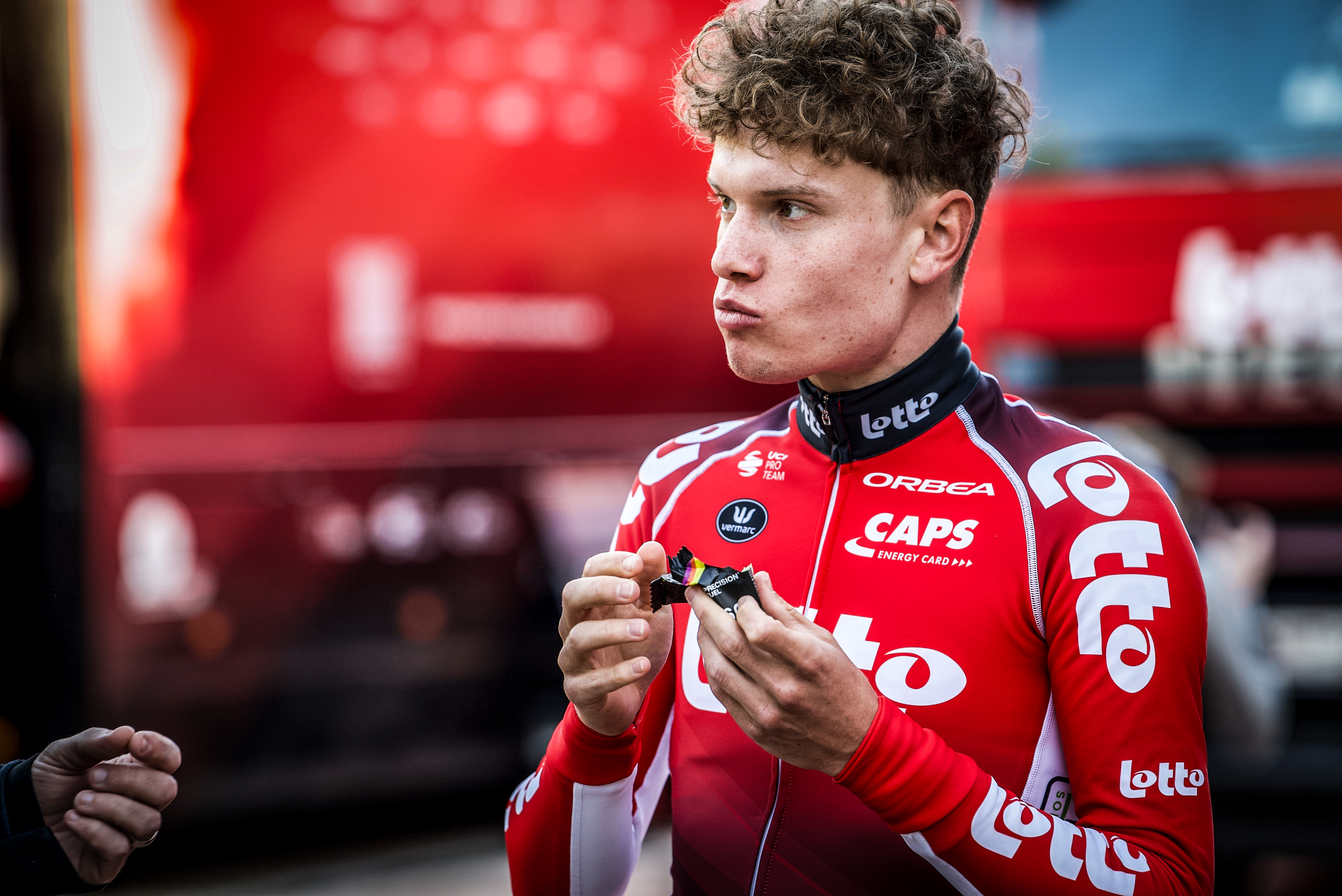
24-48 hours before the race
As is the same with early race starts, your fueling strategy in the days leading up to the race should be tailored to the duration and intensity of the exercise you’re going to undertake. The longer, more intense your event, the more important it is to ensure your glycogen stores are fully topped up before you start.
If your race is longer than 90 minutes, your body is going to rely heavily on stored glycogen, so carb loading is essential in the 24-48 hours before race day.
To do this, increase your carb intake to ~8-12g per kilogram of body weight per day (3.6-5.4g/lbs/day) while reducing fat and fibre. You could do this by adding greater portions of pasta, rice and bread to meals, and drinking a few bottles of PF Carb Only Drink Mix.
Read more: How to carb load before your next race.
If your race is less than 90 minutes in duration, full-on carb loading isn’t as necessary. Instead, there should be an even greater focus on your race day fueling, in particular that final pre-race meal to ensure you’re starting well-fueled.
How to hydrate before a late race start
Your pre-race fluid and electrolyte intake is key to optimising your hydration status before races. How hydrated you are when you get to the start line can significantly impact your performance, especially for races that are long and hot. This is particularly important if your race begins in the afternoon as race temperatures are more likely to start higher.
Preloading with a strong sodium-based electrolyte drink - rather just plain water - ahead of your race increases your blood plasma volume, general cardiovascular function, temperature regulation and muscle function.
2 hours before
Our recommended preloading protocol should still apply to your late race start.
Drink 1 x packet or tablet of PH 1500 electrolytes in ~500ml (16oz) of water 90 - 120 minutes before the race. Finish this ~45 minutes prior to the start to give your body time to fully absorb what it needs and pee out any excess.
73% of athletes in our Case Study Database preload. It's worth testing it out ahead of your long and hot training sessions before implementing it on race day.
Race day
What should you drink throughout the day when you’re preparing for a late race start?
You don’t want to drink excessive amounts of plain water. Instead, you should continue to drink as you normally would in and around meals.
Have a bottle with you and sip on it regularly throughout the day, especially if you’re travelling to the race location. If it’s hot, and you feel dehydrated at all on waking up, then adding an electrolyte tablet will help to avoid building on this dehydration.
Or you could consider using PF Carb & Electrolyte Drink Mix, which would contribute towards your carb-loading numbers and help ensure you start hydrated.
The evening before
Again, the general preloading protocol still applies.
Drink 1 x packet or tablet of PH 1500 electrolytes in ~500ml (16oz) of water the evening before your race (such as with your dinner). This will pre-empt the respiratory losses you’ll have overnight, and act as a solid foundation for your race day hydration.
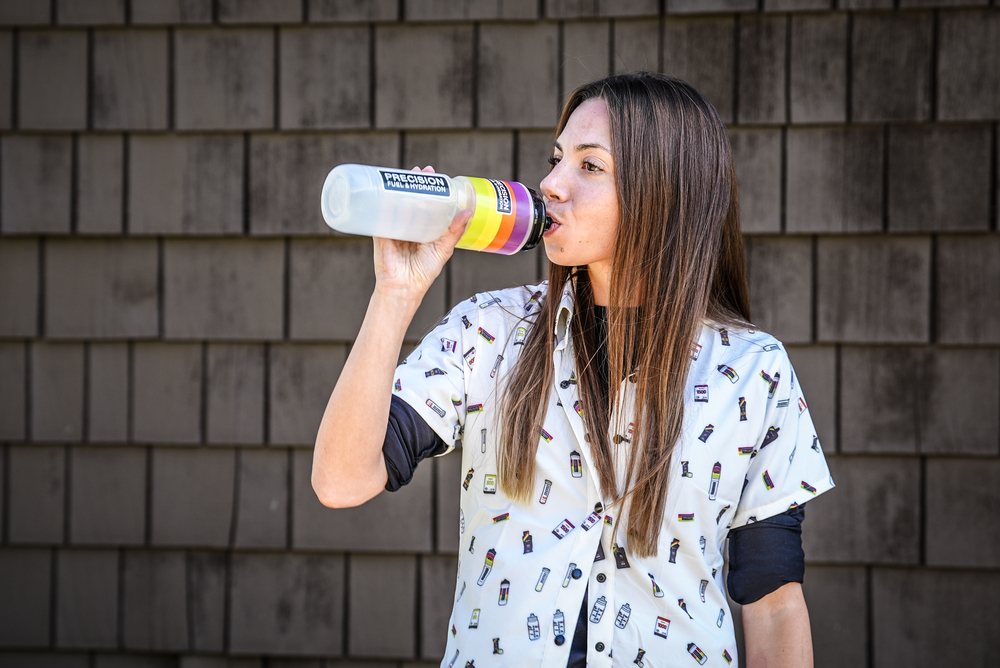
Common mistakes (and how to avoid them)
Before a late race start, you’ll have more time on your hands to fuel and hydrate. This can mean more time to top up your stores effectively, but this also means more time to get your pre-race nutrition wrong!
The most common fuel and hydration mistakes before late race starts are listed below. To help you avoid them, it’s worth practicing your race day approach by incorporating some late afternoon or evening training sessions, ideally at the same time your race is due to start.
You can practice eating and drinking like you would throughout the race day to make sure you get it right.
1. Undereating
Not using every meal opportunity on race day and the day prior often results in athletes falling short of the recommendations.
Solutions:
- Instead of just snacking, use your normal meal routine and timings to get the most of your carbs at normal meals. Top-up between meals with carb-rich snacks to hit those recommendations
- If you’re travelling to the race on the day, plan and pack what food you need ahead of time, so you have access to familiar foods and aren’t relying on service stations
- If you’re going to sleep a bit longer, you should also make sure you fuel well the night before. Then, eat as soon as you get up, so as to not miss your usual breakfast fuel store top-up
2. Overeating/mistiming your fuel intake
Snacking on comfort foods, often high in fat, is hard on the stomach and can lead to discomfort before and/or during the race. Mistiming your pre-race meals, and eating large amounts of food in the final hour before the race start can lead to reactive hypoglycaemia (a drop in blood glucose below normal as you start the race).
Solution:
- Plan your race day carb-rich snacks and meals ahead of time to make sure they include the right kinds of food (i.e. fast-digesting carbs with limited fat and fibre) and are well-timed (i.e. not too close to the race start)
3. Overdrinking plain water
A common occurrence ahead of any race, but even more likely with more time ahead of the start.
Solution:
- Drink as you normally would in the days leading into the race and on the day of the race, before implementing a preloading protocol with a strong electrolyte ~90 minutes before the gun goes off
4. Eating as you would ahead of an early race start
A later race start means that there are more opportunities to eat and drink during the day, which can be missed if athletes stick to using the same strategy they'd use before a morning event.
Solution:
- Make the most of more time to absorb a bigger carb-rich breakfast, lunch and/or dinner
5. Mistiming your caffeine intake
Caffeine has a half-life of 4-5 hours, so just having a morning coffee isn’t quite going to do the trick for an evening ultra race.
Solutions:
- Although there isn’t a huge amount of research in this area, our experience of working with athletes would suggest that it could be a good idea to stay away from the stimulant until later in the day…
- Depending on the length of the race, you might want to start using caffeine an hour before the start and then during the race. Or you could even wait until the later hours of the night to use caffeine to fight your body’s circadian rhythm (and tendency to want to sleep!)
- Read more: How to use caffeine BEFORE exercise
How elite athletes fuel before late races
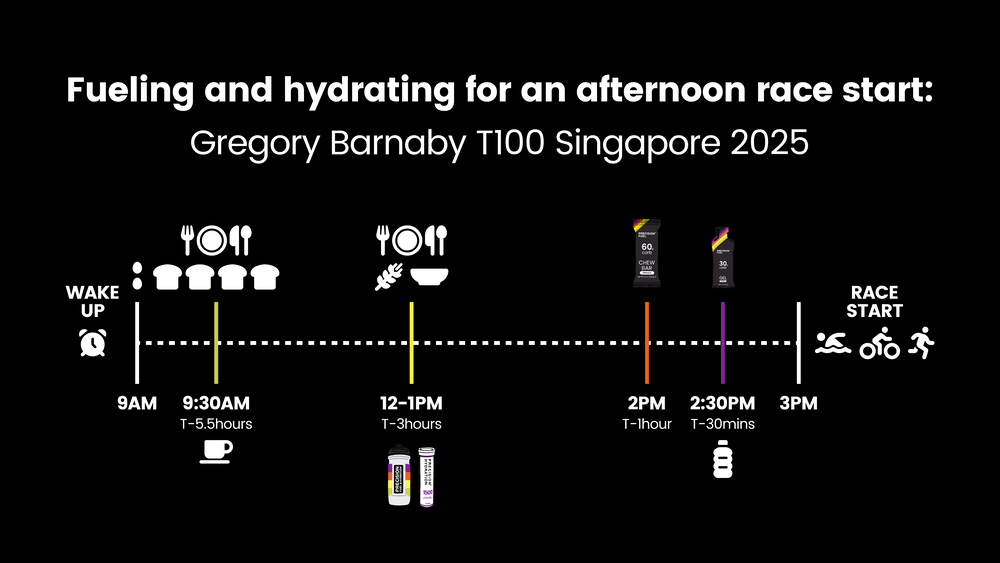
For more info on Greg’s T100 Singapore intake, read his full case study HERE. His pre-race food and drink included…
Breakfast:
- 4 x Pieces of toast with jam
- 2 x Eggs
- 300ml x Orange juice
- 1 x Espresso
Lunch:
- 100g x Rice
- 500ml x PH 1500
Snacks:
- 1 x PF 60 Chew Bar
- 1 x PF 30 Gel
- Plain water
After such a strong performance in Singapore, we asked Greg to give us a bit more info on how he plans his pre-race intake:
“On race day, I work backwards from race start time to figure out my fueling and hydration strategy. For a lunch time race, I tend to try and sleep in a bit more and have a later breakfast about 3 hours before the start.
"If I still feel hungry, I take a PF 30 Chew, and then I'll have a PF 60 Chew Bar about an hour before the race. I always have a bottle of PH 1500 that I sip throughout the morning to keep hydrated.
"I keep this more or less the same for an evening race, except for the meals, where I have a normal breakfast and then lunch 3 hours before the start.”
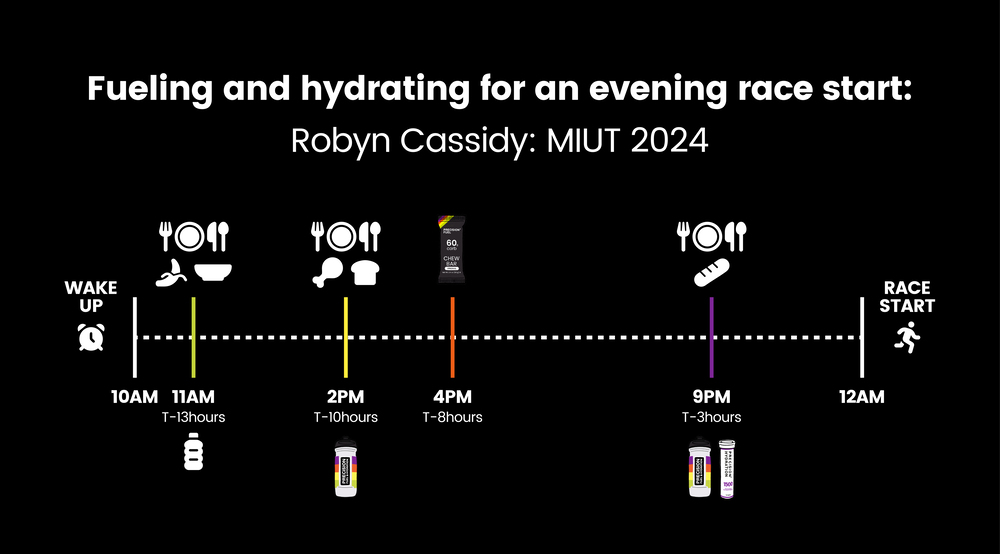
Check out Robyn’s full Madeira Island Ultra Trail case study HERE. Her pre-race food and drink included…
Breakfast:
- 1 x Bowl of porridge with chocolate spread
- 1 x Banana
- Plain water
Lunch:
- 1 x Ham sandwich
Snacks:
- 1 x Energy bar
Dinner:
- 500ml x PH 1000 (Drink Mix)
- 1 x Bagel with peanut butter
Reflecting on her pre-race intake for races starting later in the day, Robyn said:
“For late starts, I've found that I prefer to flip the day over. My breakfast is a bigger meal, followed by a simple lunch and I often have porridge for dinner around 3 hours before the race. I’m so used to porridge before running and racing, so I don’t want to change this. I always practice this a couple of times in training before an evening run and it works well for me.
"In Madeira, all my food was plain, including neutral beige carbs. I find eating loads of food throughout the day just makes me feel heavy and lethargic, so PF Carb & Electrolyte Drink Mix is a useful addition to keep the carbs coming in!”
If you need help putting together your pre-race fuel and hydration plan ahead of a late start time, you can book a free one-to-one video consultation with one of our team, or drop us an email at hello@pfandh.com.
